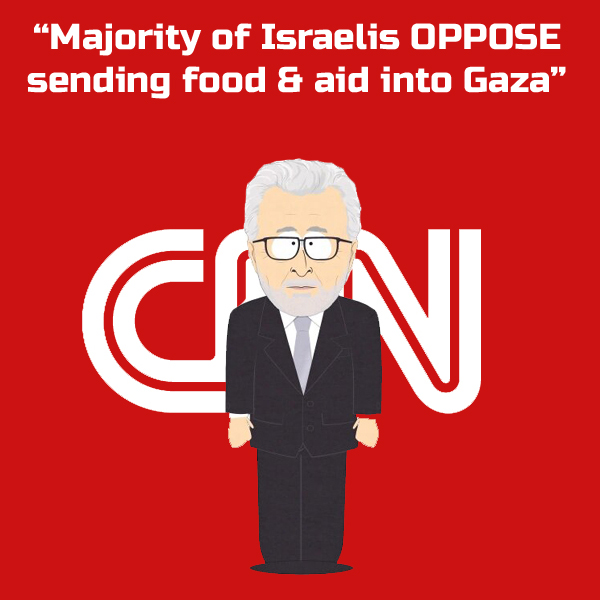CNN: Majority of Israelis OPPOSE sending food and aid into Gaza
CNN's Wolf Blitzer discusses how a majority of Israelis polled seek retribution for October 7 attacks by cutting off food and aid to Gaza.
DailyBeastie.com
7/28/20255 min read


CNN's AARON DAVID MILLER: a majority of Israelis OPPOSE sending food and aid into Gaza.



BLITZER: Happening now, President Trump and the British prime minister, Keir Starmer, are holding a bilateral meeting with the crisis in Gaza very much at the top of their agenda.
Joining us now, the former Middle East negotiator over at the State Department, Aaron David Miller. He is now a Carnegie Endowment senior fellow. Aaron, thanks very much for joining us.
As I'm sure you read in The New York Times, the Times is reporting, and I'm quoting now from that article this, "The Israeli military never found proof that the Palestinian militant group had systematically stolen aid from the United Nations, the biggest supplier of emergency assistance to Gaza for most of the war."
[10:45:00]
The Times article continues, "According to two senior Israeli military officials and two other Israelis involved in the matter.
In fact, the Israeli military officials said the U.N. aid delivery system, which Israel derided and undermined, was largely effective in providing food to Gaza's desperate and hungry population," close quote.
The time says Netanyahu's office didn't respond to a request for comment. But as you know, both President Trump and Prime Minister Netanyahu continue to claim that Hamas was stealing aid that was being brought in. Why do you think that is?
AARON DAVID MILLER, FORMER STATE DEPARTMENT MIDDLE EAST NEGOTIATOR AND SENIOR FELLOW, CARNEGIE ENDOWMENT FOR INTERNATIONAL PEACE:
Well, I think each -- in each leader Wolf -- and thanks for having me -- has a different set of rationalizations and motives.
I think the prime minister of Israel is now under increasing pressure.
He's freed from dissolution of the Knesset for the next three months until the Knesset resumed session on October 19th after the Jewish holidays.
But for Netanyahu, pressure is increasing.
And frankly, he has no good explanation.
He's presiding over the most right-wing government in Israel's history with two extremist ministers who have threatened to bolt and not only don't want to see any aid in the Gaza, Wolf, but who fundamentally believe that there shouldn't -- there should be a Gaza free of Palestinians.
A recent Israeli poll suggest that 64 percent of the Israeli public either doesn't care or cares very little about the issue of humanitarian assistance for Gaza.
So, the pressure for Netanyahu now is coming from his coalition, and it is supported by an Israeli public angered traumatized by October 7th that frankly hasn't devoted much attention or regard for what's happening in Gaza.
And what's happening in Gaza, Wolf is any definition a catastrophe, much of which could be -- could have been avoided.
BLITZER: President Trump, Aaron, was asked this morning if he agreed with Prime Minister Benjamin Netanyahu's comments that there was no starvation in Gaza. This is how the president responded. Watch this.
(BEGIN VIDEO CLIP)
DONALD TRUMP, U.S. PRESIDENT: "I don't know. I mean, based on television, I would say not particularly. Those children look very hungry. But we're giving a lot of money and a lot of food. And other nations are now stepping up."
(END VIDEO CLIP)
BLITZER: Do you think we could be seeing some daylight emerging between President Trump and Prime Minister Netanyahu on the issue of the aid crisis in Gaza?
MILLER: I think yes, and I certainly hope so.
The Biden administration actually, Wolf, had relative success in this one area. There would not have been an iota, scintilla of assistance getting into Gaza over the last 18 months had it not been for Joe Biden's pressure and focus on this issue.
But the reality is, under six months of Donald Trump and with Israeli cooperation, you have something, a concoction called the Gaza Humanitarian Foundation, which is delivered maybe 80 million meals, that's one meal a day for each individual, but the cost, Wolf, has been exorbitant in terms of Palestinian deaths.
You have large numbers of Palestinians crowded into sites, opened for a very limited period of time in the proximity of Israeli forces and soldiers.
And it seems to me, the Israeli sources suggest this as well, that fire control is broken down and the Israelis, whether they're under pressure or what -- for whatever reason, have fired on unarmed Palestinians.
And you've got, what, 800 by some -- telling a thousand Palestinians dead since the beginning of this administration. So, you need a strategy.
Just one additional point, Wolf.
And Rahm made it I think pretty strongly.
Another Israeli prime minister, Wolf, and you know them all. Ehud Olmert, Ehud Barak, Yitzhak Rabin might have responded to October 7th the same way the Israelis did, but months into this war, none of them would've essentially abandoned the reality that military power is a means to an end.
And you need a day after, you need a political strategy. And that's something you don't have.
And it's largely a consequence of the fact that for the first time in Israel's history, you have an Israeli prime minister on trial for bribery, fraud, and breach of trust in a Jerusalem district court four years and running with no accountability and frankly, no intention.
In my judgment, speaking not as an Israeli, but as American, as a human, to put more emphasis on avenging the dead when it comes to hostages than on redeeming the living and creating a sensible policy to spare the lives of hundreds of thousands of Palestinian civilians it's a tragedy, Wolf.
But unlike many tragedies, this one could have been avoided.
BLITZER: Aaron, if Prime Minister Netanyahu doesn't believe there is starvation, there's a starvation crisis in Gaza, why do you think he is now allowing for this -- what he calls this tactical pause, to allow more aid to get into Gaza?
MILLER: I mean, I think even Netanyahu -- and I don't think -- I had read that the president's comment, I hadn't -- I didn't hear him say it, but I read the transcript, said basically -- president of the United States says you can't fake starvation.
That's Donald Trump, who frankly is not a humanitarian, Wolf.
I think that prime minister -- even Prime Minister Netanyahu understands and knows that, in effect, he has to remain on Trump's good side.
And he's at least preempting by adopting these measures, they're useful, they could actually be extremely important if in fact the headline, Wolf, becomes a trend line and these measures, humanitarian pauses, facilitating human -- aid on the part of the World Food program and other U.N. groups in Gaza could actually make a difference.
BLITZER: Aaron David Miller, thanks as usual for joining us.
MILLER: Thanks for having me, Wolf.
CNN transcript of The Situation Room - 28 July, 2025
Political news, commentary for the enraged reader
contact@dailybeastie.com
© 2025 DailyBeastie.Com - All rights reserved.

